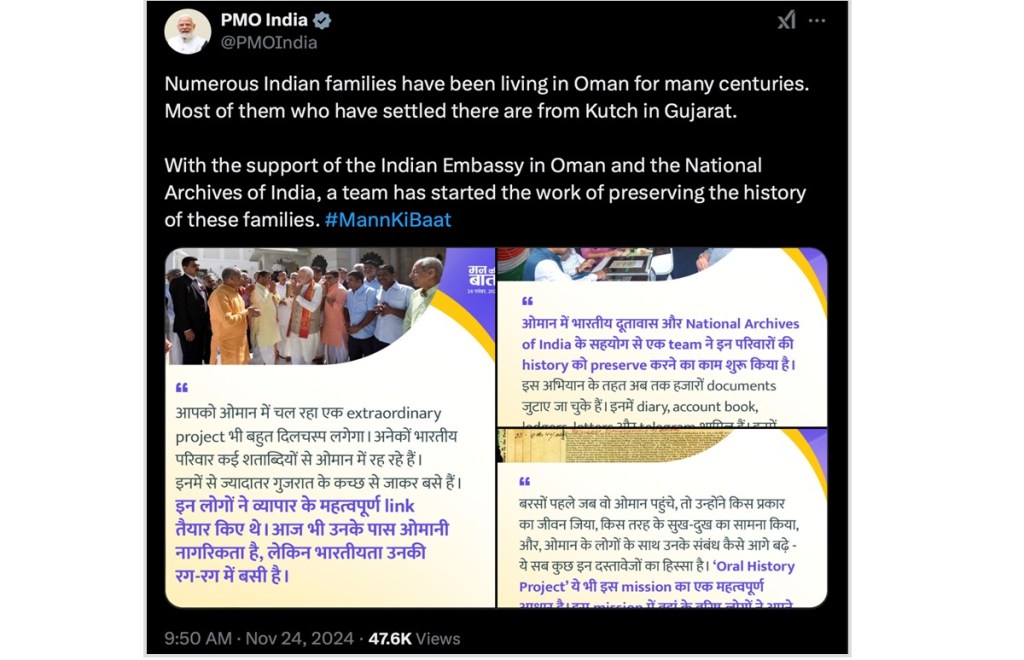In a landmark initiative, the National Archives of India (NAI) is organizing a special exhibition on diaspora archives at the Pravasi Bharatiya Diwas (PBD) 2025. This exhibition will showcase the “Oman Collection – Archival Heritage of the Indian Community in Oman,” a project spearheaded by the Embassy of India in Muscat in collaboration with the NAI. Prime Minister Narendra Modi, who highlighted the project during his Mann Ki Baat in November 2024, is set to inaugurate the exhibition.
The Digitization Project: A First-of-Its-Kind Initiative
Launched in May 2024, the Oman Collection is the first overseas digitization project by the NAI, aimed at preserving the historical records of the Indian community in Oman. The project digitized over 7,000 documents from private collections of prominent Indian families, many of whom have been settled in Oman for over 250 years. These documents—ranging from personal diaries to trade invoices—offer a window into the community’s long-standing cultural and commercial contributions to Omani society.
The documents cover a wide time span, with the oldest dating back to 1838, and many from the late 19th and early 20th centuries. The digitized materials include letters, photographs, business records, and personal accounts that reflect the community’s integration into Oman, their cultural practices, and their role in trade and commerce. The records also highlight the preservation of Indian traditions abroad.
Indian Community in Oman: A Rich Legacy
The Indian diaspora in Oman is one of the largest in the region, with nearly 700,000 people. Indians have had a historical presence in Oman for over 5,000 years, with a significant migration of Gujarati merchant families beginning in the late 18th century. Today, many of these families are an integral part of Omani society, contributing to its economy, culture, and social fabric. Several members of these families have even acquired Omani citizenship.
Through this project, the NAI has digitized records from well-known families like the Ratansi Purshotam, Khimji Ramdas, and Haridas Nensey families, among others. These documents offer a detailed look at their lives, providing insights into their entrepreneurial activities, migration journeys, and social integration in Oman.
Oral Histories: Adding Personal Narratives
In addition to documents, the project included the recording of oral histories from older members of the Indian community in Oman. This first-ever oral history initiative by the NAI captures personal stories, migration experiences, and reflections on the evolution of the community in Oman. These narratives, alongside the digitized records, provide a rich and holistic view of the Indian diaspora’s journey over the centuries.
A Milestone for the National Archives of India
This project represents a historic achievement for the NAI, marking the first time it has digitized private diaspora archives abroad. Arun Singhal, Director General of NAI, called it a significant step in preserving the heritage of the Indian diaspora. The digitized documents will be made available on the NAI’s digital portal, Abhilekh Patal, providing access to researchers, scholars, and the public.
Strengthening India-Oman Ties
The project aligns with Prime Minister Narendra Modi’s vision of deepening India’s engagement with its diaspora. Ambassador Amit Narang noted that the project not only preserves the community’s history but also reinforces the strong bonds between India and Oman. Sheikh Anil Khimji, a prominent member of the Indian community in Oman, expressed his appreciation for the initiative, highlighting its importance in strengthening cultural and historical ties between the two nations.
Looking Ahead
Beyond preserving records, the digitization initiative fosters a deeper understanding of the Indian diaspora’s development in Oman. Supported by Oman’s National Records and Archives Authority, this effort underscores the enduring friendship between India and Oman. The project is set to serve as a valuable resource for future generations, offering insights into the history, culture, and contributions of the Indian community abroad.
As the exhibition opens at PBD 2025, it will serve as a powerful reminder of the significance of preserving diaspora heritage while strengthening global connections.


